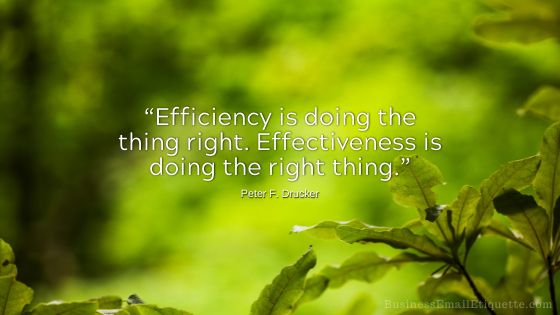Tips for Working from Home, Business Email and Discipline

Telecommuting is nothing new. Many businesses are now offering the option of working from home. However, employees with this option need to understand that they require a different mentality to be successful and demonstrate that they are valued employees.
But what if you’ve never worked from home or are not full-time? Now is the time to embrace the right mindset and organizational skills to keep you on track, your workflow productive, and you stand out from the rest.
My Story…
I have worked out of my home office for over two decades. However, I had my own offices for several years in the beginning. Because the Internet and the Web were relatively new, meeting me in person and having a physical location helped establish trust.
After that, I rented a professional office suite in a complex with other small businesses. Next, I utilized a virtual office where staff handled everything (answering phones, making appointments, etc.), and I would simply show up to meet with clients.
What worked for me…
If you are starting your own business from home, you’ll discover the right mix of factors that contribute to your business success. At some point, you may want a physical location if you believe it is beneficial.
Several years after establishing my business, I realized a physical address or location was unnecessary. So, I went wholly virtual and never looked back.
In my opinion, virtual work environments will become increasingly commonplace. Businesses will discover they are more cost-effective (with the right employees). By becoming that type of employee, you will enhance your career opportunities.
Employees will discover the added benefit of a better quality of life (no commute time, reduced traffic, and less expensive wardrobes) and seek virtual opportunities. It’s a win-win.
Working from Home = Discipline
Your ability to work remotely successfully will be proportionate to your level of discipline. It will also reflect on you as an employee, your work ethic, and whether your employer can trust you to complete the job.
Most incorrectly surmise that working from home means you can stay in your PJs, get up in the morning when you feel like it, watch TV, and work less. Unfortunately, that is not the case.
While working at home is often considered a more flexible environment, that’s not always the case. Yes, I may take a break, run an errand, or walk my pup. However, overall, I put in a solid 8-hour minimum workday—plan to do the same.
To succeed at working from home, having a daily schedule can make your virtual work arrangement beneficial to both you and your employer.
Here’s my daily schedule.
- I get up at sunrise every day, shower, get dressed, and be presentable for my daily video conferences. I am in my home office before my posted hours. I’m not in PJs or on the couch.
- My lunch typically lasts 10-20 minutes, usually between 12 p.m. and 1 p.m. For lunch, I normally grab a bottle of water from the fridge, some yogurt, or a piece of cheese (or two) that I take back to my home office, where I continue working.
- At the end of the day, I power down my computer until the next morning. After that, I am “off of work”!
I love what I do, and I work at it all day. Being raised with a solid work ethic made working from home easy for me. Your discipline will make or break your work-at-home experience.
Working at Home for Newbies
For those new to working at home, assume you will put in a solid 8-hour day. As I have, you will want to create a regular schedule that works for you. And then stick to it.
Your employer will likely have guidelines and requirements, including productivity goals, that they’ll advise you of. Then, do not hesitate to ask for the tools, software, or resources you need to meet those goals.
Similarly, your employer may be new to this virtual environment as well, and your input will help make this transition work for everyone. Both sides must be flexible until processes and procedures solidify and the dust settles.
Know that your employer will expect you to accomplish as much, if not more, than if you were to go into the office. Working from home does not mean less work.
Managing Business Work Email at Home
Typically, your work email is on your work PC when you leave the office, and you won’t check it until you return in the morning. Now that you work from home, you’ll want to set up your work account to use it from your home device.
Increased Email Volume
You may likely be emailing more than you ever have before. Your email communication skills will be even more critical to clarity in your communications, including avoiding any unnecessary misunderstandings. Here are the basics to start.
Consider acquiring a copy of my Business Email & Technology Etiquette eBook. It’s only $4.95, and all revenue goes towards covering the expenses of keeping this site up and running.
Why not become the epitome of professional business communications when it is essential to your job performance? Email to impress.
Keeping Focused
If you don’t have a designated home office, create a small workspace in a designated area. Sitting on the couch with your laptop and TV in the background impairs efficiency and productivity.
Consequently, you will want to eliminate any distractions that can cause you to lose focus or make errors. Let those at home know you are working and appreciate not being disturbed while in that space.
By keeping a schedule, setting goals, and designating your “space,” you set yourself up for success. Then, be flexible as you determine what will work best for you and your employer.
Since you won’t have to commute or deal with in-office distractions, you’ll likely find that you’re more productive than ever. As with anything, you get out what you put in.







